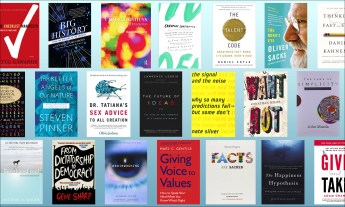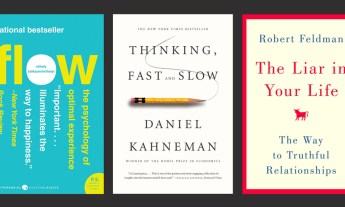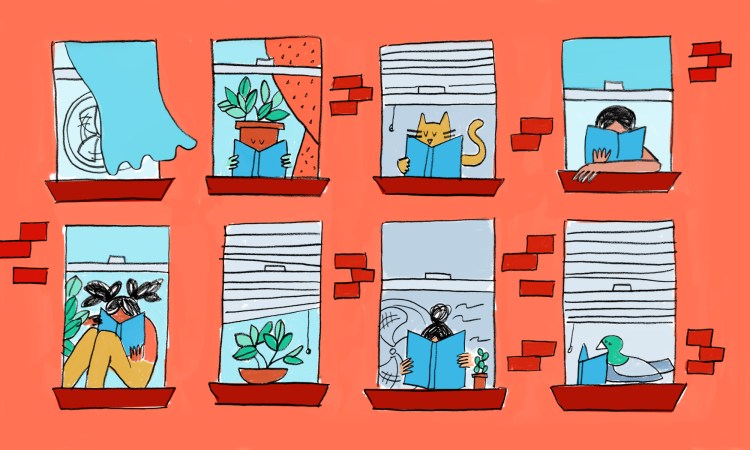
Here’s a huge list of TED speaker-recommended books, with all the diversity of titles and topics you might expect. No matter your mood, preference or occasion, we’ve got you covered.

When you’re lying in the sun
Any book by Isaac Asimov
I have stacks of collections of science-fiction short stories. I grab these before getting on a long flight, so if a story is just unreadable, I have 20 others to try. Asimov was one of my favorites, and I still love his books. They were my go-to as a 10-year-old (which is still my normal mental state).
— Todd Scott (TED Talk: An intergalactic guide to using a defibrillator)
LoveStar by Andri Snaer Magnason
This novel by Icelandic writer Magnason is set in the future when technology has been entrusted with many aspects of human interaction, including identifying and bringing together soulmates, while “unscientifically validated relationships” are callously wrecked. Young, blissfully-in-love couple Indridi and Sigrid have their perfect lives threatened, along with Indridi’s sanity, when they are “calculated apart” and forced to go to extreme lengths to prove their love. A suspenseful and inspiring novel about man vs. machine, the imperfections that make us human, and what it is that really matters in life.
— Thordis Elva (TED Talk: Our story of rape and reconciliation)
A Hundred Thousand Hours by Gro Dahle, translation by Rebecca Wadlinger
This is a book of poetry by an acclaimed Norwegian poet — but unless you speak Norwegian, you’ve probably never heard of her. To my knowledge this is the only book of hers to be translated into English. The poetry is emotionally resonant, strange and surreal in the best way, and it feels both accessible and fresh.
— Carrie Nugent (TED Talk: Adventures of an asteroid hunter)
Another Great Day at Sea: Life Aboard the USS George H.W. Bush by Geoff Dyer
Dyer had a residency aboard a US naval air carrier. While his description of the experience is informative, more than that it’s also hilarious and surprisingly moving. He is such good company — they were lucky to have him.
— Mary Norris (TED Talk: The nit-picking glory of The New Yorker’s Comma Queen)
Elizabeth Street by Laurie Fabiano
I enjoyed reading this historical novel that was based on true events. It gave me a vivid sense of what it was like to live in New York City in the early 1900s as an Italian immigrant — and what it may have been like to be targeted by the Black Hand, the precursor to the Mafia.
— Eduardo Briceño (TED Talk: How to get better at the things you care about)
Consider the Years: 1938–1946 by Virginia Graham
These poems are sweetly witty, modest, rich with touches of gaiety and melancholy, charmingly and unmistakably English.
— Simon Anholt (TED Talk: Who would the rest of the world vote for in your country’s election?)
The Ordering of Love: The New & Collected Poems of Madeleine L’Engle by Madeleine L’Engle
L’Engle is best known for her award-winning children’s literature, but I enjoy all of her books. This collection is a book I return to in every season of my life as she ponders love, purpose, loss, faith, history and humanity.
— Amy Green (TED Talk: A video game to cope with grief)
The Phantom of the Opera by Gaston Leroux
I’m re-reading my favorite gothic horror book in its original French format. Leroux was a popular mystery author in the early 1900s. The book is far from Andrew Lloyd Webber’s romanticized musical version, and it’s frightening in the most compelling way.
— Alix Generous (TED Talk: How I learned to communicate my inner life with Asperger’s)
Imitations by Robert Lowell
This book contains beautiful and sensitive not-quite-translations of poetry from many ages and languages — pay special attention to his “imitations” of the great 20th-century Italian poet Eugenio Montale.
— Simon Anholt (TED Talk: Who would the rest of the world vote for in your country’s election?)
Version Control by Dexter Palmer
This novel treads a fine line between modern literature and science fiction, perfectly adapting the evocative prose and mystery of one and the excitement and uncertainty of the other. Primarily following the middle-age crisis of Rebecca — a woman who feels something is deeply wrong with her universe — the book explores whether her ennui is caused by the banality of modern life, a mysterious family tragedy or something that’s gone terribly wrong with her physicist husband’s “causality violation” experiment. While it’s set in a not-too-distant future of autonomous cars, pervasive social networking and online dating, the struggles of the characters to find meaning, purpose and love are timeless.
— Natasha Hurley-Walker (TED Talk: How radio telescopes show us unseen galaxies)
Lillian Boxfish Takes a Walk by Kathleen Rooney
A charming story based on a real character. The protagonist is a very successful advertising executive at Macy’s, and the book spans her life from early adulthood through old age. It gives wonderful glimpses of NYC and its neighborhoods.
— Kathy Hull (TED Talk: Stories from a home for terminally ill children)
Deep Down Dark: The Untold Stories of 33 Men Buried in a Chilean Mine, and the Miracle That Set Them Free by Héctor Tobar
In the tradition of books like Alive and In Cold Blood, Deep Down Dark is a nonfiction account that reads like a novel. Tobar tells the story of 33 Chilean miners trapped underground for more than two months at the San Jose Mine. What makes the book so riveting is how he manages to capture both the detailed (and fascinating) logistics of staying alive and the fear and longing that shapes both their survival and their subsequent celebrity.
–Mandy Len Catron (TED Talk: A better way to talk about love)
Multiple Choice by Alejandro Zambra
This seriously playful book, by one of the brightest young stars in the Latin American literary firmament, defies categorization. It calls on the reader to make parts of its narrative disappear. The book subtly alludes to the plight of “the disappeared” (i.e., Chileans who did not fit with the state’s narrative under Pinochet). But it also invites us to ask who is shaping the narratives of our own time and place. As a potent indictment of the multiple-choice test, the book will also appeal to students still smarting from poor grades in end-of-year exams.
— Jonathan Marks (TED Talk: In praise of conflict)
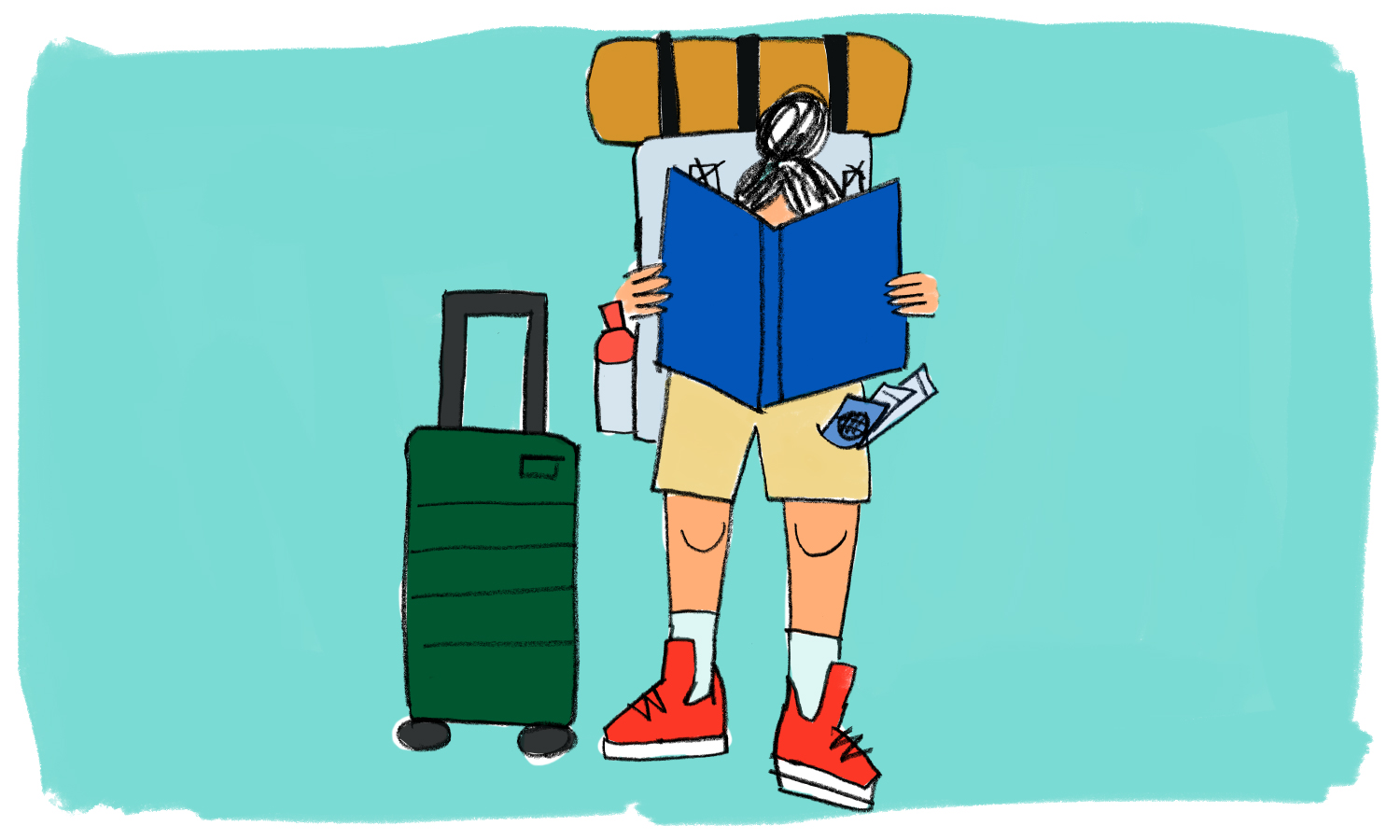
When you’re in the mood for adventure
The Book of Lost Things by John Connolly
After the death of his mother, a grieving young boy enters a magical world. What follows is far from a children’s fairytale — bloody, decomposed corpses dot the narrative — but an allegory for loss, anger and redemption. Plus: there are wolves, beasts, knights, etc.
— Caitlin Doughty (TED Talk: A burial practice that nourishes the planet)
Love and Trouble: A Midlife Reckoning by Claire Dederer
This erotically charged memoir grabbed me by the throat. Dederer reckons with the way her carefully crafted, mom-dad-and-two-kids idyll begins to crumble at mid-life (my favorite chapter is, “How to Have Sex with Your Husband of 15 Years”), as well as with her “chaotic past” as a “disastrous pirate slut of a girl.” This book is about being a woman, a wife, a mother, a daughter, a sexual being. Plus, as her experiments with form in various chapters show, she is a brilliant stylist.
— Peggy Orenstein (TED Talk: What young women believe about their own sexual pleasure)
The Bad-Ass Librarians of Timbuktu — And Their Race to Save the World’s Most Precious Manuscripts by Joshua Hammer
An unexpected and inspirational book. Timbuktu had been the center of Arabic scholarship in the Sahara for centuries, and in the 1990s, a meek, obsessive bibliophile named Abdel Vader Haidara amassed an unprecedented collection of hundreds of thousands of amazing ancient manuscripts. Along came Al Qaeda, taking over Timbuktu, intent on stealing, selling or burning every manuscript. Remarkably, Haidara and crew, with great risk and derring-do, manage to spirit all the manuscripts away to safety. The librarians prove mightier than the sword.
— Robert Sapolsky (TED Talk: The biology of our best and worst selves)
Pocket Atlas of Remote Islands: Fifty Islands I Have Not Visited and Never Will by Judith Schalansky
Schalansky disproves dogeared advice to “write about what you know.” Born on what her publishers call “the wrong side of the Berlin Wall,” she learned to travel in her imagination and shares the fruits of her voyages in this wonderful little book. You might think of it as a collection of stories about explorers and castaways, or as a set of meditations on people and place. If you cannot afford to leave home this summer, open the book at random and allow Schalansky to be your guide. Unlike the book’s less fortunate characters, you are guaranteed safe passage home, but you will not return unchanged.
— Jonathan Marks (TED Talk: In praise of conflict)
When you want to understand what’s going on in the world
The Handmaid’s Tale by Margaret Atwood
Many folks seeking knowledge focus on nonfiction, forgetting that fiction allows the reader to go beyond learning about an experience; it lets us feel the experience and the emotions connected to it. This 1985 novel has recently been revived as a TV series at a time when its lessons are likely more relevant than many of us would like to admit. I first read Atwood’s masterpiece as a first-year college student, not realizing the philosophies and truths within its pages would steer the whole of my career. If you are interested in feeling, and not just understanding, the severe impact of sexual and reproductive objectification of women, I’d start here.
— Sofia Jawed-Wessel (TED Talk: The lies we tell pregnant women)
I read this several years ago but — much like Orwell’s 1984 — it seems particularly relevant given our current political morass.
— Grady Booch (TED Talk: Don’t fear superintelligent AI)
Behind the Beautiful Forevers: Life, Death, and Hope in a Mumbai Undercity by Katherine Boo
This is a beautifully written and painstakingly researched book that takes the reader deep into the lives of the fascinating, vulnerable and unbelievably resilient residents of one of Mumbai’s slums, Annawadi. Boo’s language is poetic and engaging, making this work of nonfiction a true can’t-put-it-down summer read. At the same time, the book offers critical social and political commentary concerning the unforeseen consequences of misguided or misinformed policy efforts that are aimed at mitigating the pervasive effects of systemic poverty.
— Wendy Troxel (TED Talk: Why school should start later for teens)
The Plundered Planet by Paul Collier
More progress has been made to address global development issues in the last 10 years than in any prior decade. But how did we end up here in the first place? With precise cause-and-effect analyses, Collier deftly confronts how world leaders have mismanaged natural resources and created a malady of human-made ills for the poorest populations on Earth.
— Hugh Evans (TED Talk: What does it mean to be a citizen of the world?)
Land of Open Graves: Living and Dying on the Migrant Trail by Jason de Leon
Since the 1990s, US border enforcement policy has transformed the rugged Sonoran Desert of Arizona into a killing ground. Against a backdrop of the historical, political and economic context of border crossing, de Leon evocatively captures the human experience of border-crossers and the federal policies that shape their lives and deaths.
— Katie Hinde (TED Talk: What we don’t know about mother’s milk)
The More They Disappear by Jesse Donaldson
There’s a lot of talk about the opioid crisis these days, but what’s missing from the statistics is the human story, the understanding of why people are making the choices they do. This novel, which focuses on Kentucky in the 1990s, gave me that understanding. After I finished it — which didn’t take long because I couldn’t put it down — I felt like I had physically been transported to that time and place.
— Carrie Nugent (TED Talk: Adventures of an asteroid hunter)
One Child: The Story of China’s Most Radical Experiment by Mei Fong
This book is a fascinating exploration of one of the most radical experiments the world has ever seen — China’s population control policy — and its consequences, which include a vast gender imbalance and a rapidly aging workforce. Interlaced with her personal and often humorous quest to conceive a child, Fong tells unforgettable stories of resilience and ingenuity in Chinese families, without shying away from the horrors of forced abortions and sterilizations under the policy. This book is a compelling must-read, as attempts to control women’s reproductive rights are still ongoing throughout the world.
— Thordis Elva (TED Talk: Our story of rape and reconciliation)
Mr. Putin: Operative in the Kremlin by Clifford Gaddy and Fiona Hill
This book offers the consummate psychological profile of the man in the Kremlin. By understanding what drives Putin — pay particular attention to “The Statist” chapter — we can unravel how the country’s chaotic flirtation with liberal democracy in the 1990s morphed into the Russia we know today.
— Laura Galante (TED Talk: How (and why) Russia hacked the US election)
Bad Feminist: Essays by Roxane Gay
These essays critique the culture and media we consume, including literary representations of women, from a very personal perspective. The images we are inundated with and the stories we are told shape who we become, and Gay’s witty and sophisticated analysis allows us to be more cognizant of this process.
— Sofia Jawed-Wessel (TED Talk: The lies we tell pregnant women)
Homegoing by Yaa Gyasi
This novel is a magical, three-century epic story about colonialism, the slave trade, ancestry and the traumas that are passed down from one generation to the next. The beautifully told story invites us to reconsider the root causes of our present-day social justice issues — racism, mass incarceration, poverty, gentrification and more.
— Vanessa Garrison (TED Talk: When Black women walk, things change)
Strangers in Their Own Land: Anger and Mourning on the American Right by Arlie Russell Hochschild
Recent elections revealed a shifting electoral landscape in the US shaped by an increasingly polarized electorate and the rise and success of the Tea Party. Through hundreds of conversations in rural Louisiana about family, community and environment, sociologist Hochschild illuminates the worldview and philosophy of grassroots supporters of the Tea Party. Honest and riveting, if not always comfortable, this book will provide important insights to people across the political spectrum.
— Katie Hinde (TED Talk: What we don’t know about mother’s milk)
If you are a liberal who interacts primarily with other liberals, you probably struggle to understand how anyone could vote for Donald Trump. This is a great book for those who want to take seriously the perspective of conservatives living in red-state America. Hochschild is one of the greatest sociologists of all time, and she’s an effective shepherd for liberals interested in leaving their bubble.
— Robb Willer (TED Talk: How to have better political conversations)
Overconfidence and War: The Havoc and Glory of Positive Illusions by Dominic D.P. Johnson
Johnson uses studies from military affairs to explore the various psychological and political sources of overconfidence. These lessons are important, of course, not just for world-changing cases of global conflict, but also for day-to-day decision making in business and personal affairs. Our tendency to overestimate our capabilities and to believe that we can control the future — what the author thinks of as “an integral part of the human psyche” — can be our downfall. In geopolitics, self-deception can lead to war; in business, it can lead to strategic blunders or worse. It’s important to test what we know, uncover what we don’t know, understand where we are prone to bias, and calibrate our goals and risk-taking.
— Martin Reeves (TED Talk: How to build a business that lasts 100 years)
The Shock Doctrine: The Rise of Disaster Capitalism by Naomi Klein
This book offers a great combination of politics and history. It opened my mind on how isolated we used to be and how everything is globally connected.
— Sebastián Bortnik (TED Talk: The conversation we’re not having about digital child abuse)
America’s Other Army: The U.S. Foreign Service and 21st-Century Diplomacy by Nicholas Kralev
For a long time, I was only generally aware of the US Foreign Service and what it meant be an American diplomat serving overseas. Then I began doing lecture tours for the US State Department, going to different countries where I started meeting diplomatic officers. Kralev’s book does an excellent job at introducing us to the remarkable people who serve abroad for long stretches of time and make considerable sacrifices in their personal lives. Read this book, and learn about the other face of America that’s being shown to the world by our diplomats.
— Nagin Cox (TED Talk: What time is it on Mars?)
Spam Nation: The Inside Story of Organized Cybercrime — from Global Epidemic to Your Front Door by Brian Krebs
80% of what we really deal with in cybersecurity is not nation-state activity, it’s organized crime — and Krebs outlines exactly how these crime syndicates work, what motivates them and what are some of the techniques they use.
— Caleb Barlow (TED Talk: Where is cybercrime really coming from?)
The Tallinn Manual 2.0 on the International Law Applicable to Cyber Operations edited by Michael N. Schmitt
This book is an outstanding view into the legal aspects of cyber crime, discussing what constitutes an act of war or an act of aggression. Reading it makes you quickly realize that international law has a lot of catching up to do with the digital world.
— Caleb Barlow (TED Talk: Where is cybercrime really coming from?)
Just Mercy: A Story of Justice and Redemption by Bryan Stevenson (TED Talk: We need to talk about an injustice)
This is one of those books that will hang onto you, long after you finish reading. It is an exceptionally well-written memoir that provides a startling depiction of the depths of institutionalized racism that pervade the US criminal justice system, particularly as it relates to death-row inmates. Before reading this book, I had an intellectual sense of how institutionalized racism manifests itself in criminal justice, but reading this book really opened my eyes not only to the pervasiveness of the problem but also to concrete and tragic examples of the real lives that have been destroyed by injustice.
— Wendy Troxel (TED Talk: Why school should start later for teens)
A Room of One’s Own by Virginia Woolf
Many of us had Virginia Woolf as required reading at some point in our schooling, but I think her works are worth revisiting as an adult. Woolf’s intended audience in this book is women writers, but it’s just as relevant to social scientists or anyone looking to examine patriarchal culture. Her observations and insights are just as meaningful now, nearly a century later, as they were when she first wrote this extended essay, unfortunately.
— Sofia Jawed-Wessel (TED Talk: The lies we tell pregnant women)
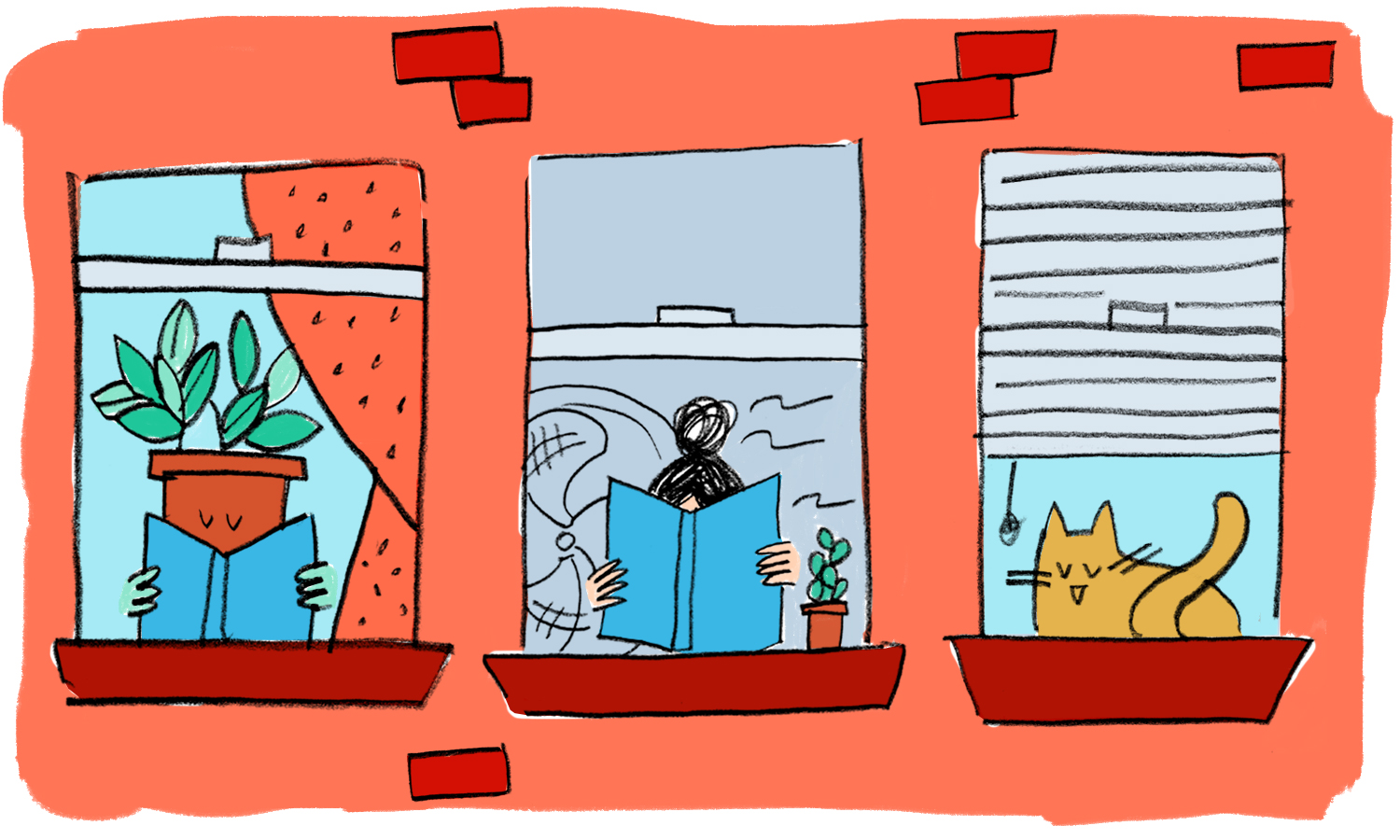
When you’re spending summer in the city
Dream Cities: Seven Urban Ideas That Shape the World by Wade Graham
This book will be enjoyed by armchair architects and urbanists who are curious about the deeper ideas and philosophies behind the different types of urban environments we have in the world today. A very thoughtful and well-conceived read.
— Jeff Speck (TED Talk: 4 ways to make a city more walkable)
The Image of the City by Kevin Lynch
Lynch was an American urban planner and author. In this book, he elaborates on how people can orient themselves in urban environments by means of mental images, maps that are produced in our brains by combining immediate sensations and the memories of our past experiences with that city or area. It’s a fascinating read about how our minds distort our surroundings according to our unique perceptual view of them. It can change how you walk your city, for the better.
— Giorgia Lupi (TED Talk: How we can find ourselves in data)
Street Fight: Handbook for an Urban Revolution by Janette Sadik-Khan (TED Talk: New York streets — not so mean any more)
The author was the transportation chief for past NYC mayor Mike Bloomberg. If you want to dive into how change happens in cities, this book has a lot of great and useful stories.
— Jeff Speck (TED Talk: 4 ways to make a city more walkable)
When you’re itching to go back to school
Democracy Reinvented: Participatory Budgeting and Civic Innovation in America by Hollie Russon Gilman
While everyone is complaining about the lack of civic participation in America, this author explores how other nations have moved beyond “just voting” in terms of getting citizens truly involved. Participatory budgeting seems at first like a dry, wonkish idea for dispersing funds into a community, but it is really a unique way to drive citizen involvement deep into the taproots of democracy. A timely and great book.
— Ari Wallach (TED Talk: 3 ways to plan for the (very) long term)
Fragile Dominion: Complexity and the Commons by Simon A. Levin
Ecosystems and other complex adaptive systems upon which we all rely can have a fragility, a limit to their resilience, which it is important for us to understand. My collaborator, Simon Levin, a Princeton mathematical ecologist and National Science Medal winner, looks at the properties that make natural and managed ecosystems fragile or resilient, and he derives a set of principles for creating and maintaining enduring systems. The consequences for preserving ecosystem viability are profound, especially right now with the teetering political unity to address climate change. And the principles he writes about apply beyond ecology and have important implications for the durability of business models, companies and business ecosystems.
— Martin Reeves (TED Talk: How to build a business that lasts 100 years)
The Undoing Project: A Friendship that Changed Our Minds by Michael Lewis
Lewis’ latest book offers a good overview of psychologists Daniel Kahneman and Amos Tversky’s foundational work on judgment and decision-making. But its greatest achievement is in vividly portraying what a sustained academic collaboration looks and feels like. Long-term academic collaborations can help each person think bigger and better — it is an amazing experience that Lewis artfully captures.
— Robb Willer (TED Talk: How to have better political conversations)
The Smartest Kids in the World: And How They Got That Way by Amanda Ripley
This book is a timeless read for anyone with children in their lives. Ripley breaks down different educational systems and a lot of the myths we perceive about what society calls genius.
— Karim Abouelnaga (TED Talk: A summer school kids actually want to attend)
Inferior: How Science Got Women Wrong — and the New Research That’s Rewriting The Story by Angela Saini
I very much appreciated Saini’s challenge of popular stereotypes around women in science. From Darwin onwards, male scientists have often brought their own gendered expectations into understanding women. This book challenges many myths, like the idea of the female brain and man as hunter, and pays tribute to the work of female scientists who fight sexism in their fields.
— Deeyah Khan (TED Talk: What we don’t know about Europe’s Muslim kids)
Behave: The Biology of Humans at Our Best and Worst by Robert M. Sapolsky (TED Talk: The biology of our best and worst selves)
Due to my work filming with former jihadis, I’ve become very interested in understanding more about human interaction. Behave explores human nature, from the firing of a synapse all the way to the broader effects of culture. Based on a wide and multidisciplinary knowledge of science, this book provides a fascinating exploration of humanity, which might give us some important information on how we can work towards a better future for us all.
— Deeyah Khan (TED Talk: What we don’t know about Europe’s Muslim kids)
Pandemic: Tracking Contagions, from Cholera to Ebola and Beyond by Sonia Shah
This book provides a compelling portrait of the modern landscape of global disease. Shah (TED Talk: 3 reasons we still haven’t gotten rid of malaria) examines the scientific and cultural histories of pandemics and explores the emerging technology behind the world’s most innovative systems of outbreak detection and prevention. It’s a must-read in a world as interconnected as ours.
— Hugh Evans (TED Talk: What does it mean to be a citizen of the world?)
Word by Word: The Secret Life of Dictionaries by Kory Stamper
Stamper is a lexicographer by occupation and by nature. Her popular blog for the Merriam-Webster website was perhaps the springboard for this book, which is the best-ever written about a dictionary. Stamper is a terrific, sharp-tongued writer, with — as might be expected — a mind-blowing vocabulary.
— Mary Norris (TED Talk: The nit-picking glory of The New Yorker’s Comma Queen)
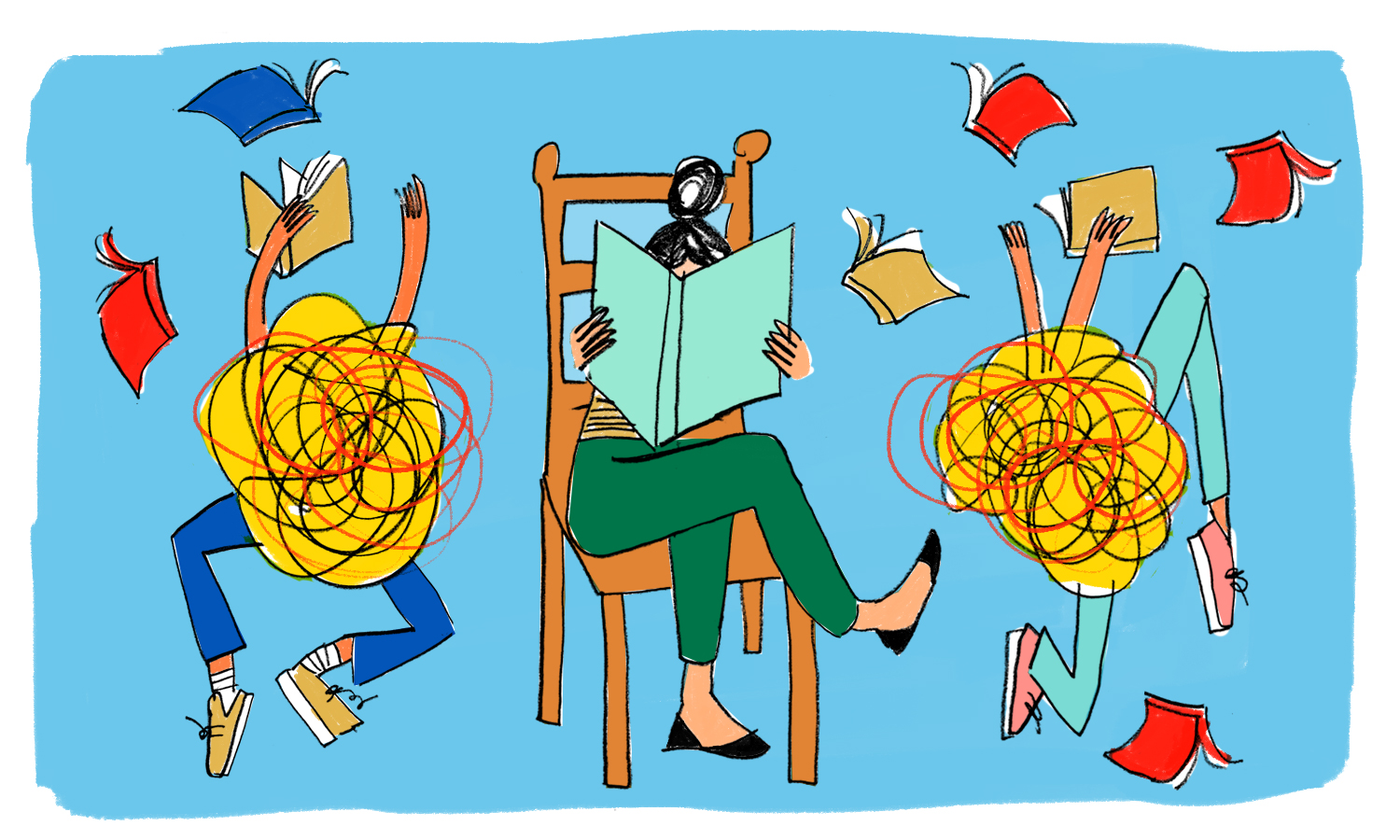
When your kids are restless
A Is for Activist by Innosanto Nagara
Now that we are parents, we read this book to our toddler every day. This book has all of the progressive values that we want our daughter to learn to make the world a better place.
— Jenni Chang (TED Talk: This is what LGBT life is like around the world)
The Monster at the End of This Book by Jon Stone
I recently reread this children’s classic. It’s surprisingly relevant now, and shows us the irrational fears we can have of various groups.
— Todd Scott (TED Talk: An intergalactic guide to using a defibrillator)
Sidney and Norman: A Tale of Two Pigs by Phil Vischer
As a mother of five children, I’ve read a lot of bedtime stories. I’ll admit when I see long blocks of text I start skipping pages, hoping the kids won’t notice. But I’ve never been tempted to skip a single sentence of this delightful children’s book. It still brings me to tears and reminds me what matters most in life and parenting.
— Amy Green (TED Talk: A video game to cope with grief)
Good Night Stories for Rebel Girls by Elena Favilli and Francesca Cavallo
This is an illustrated children’s book by the co-founders of Timbuktu Labs and creators of the first iPad magazine for children. It’s packed with 100 bedtime stories about the lives of 100 extraordinary women from the past and the present, illustrated by 60 female artists from all over the world. It is a must-read for all children. For adults, it shows a diverse look at the world, illustrating women as distinguished, accomplished and, most of all, tenacious.
— Giorgia Lupi (TED Talk: How we can find ourselves in data)
A Great and Terrible Beauty by Libba Bray
This book is the start of a young-adult trilogy that follows a teenager named Gemma Doyle. It begins with her at a finishing school in London after she witnessed her mom commit suicide. While Gemma is prepping for her debut in London society, she discovers she has special abilities that are linked to the school’s history. It takes place in the Victorian era, which also attracted me to this story.
— Alix Generous (TED Talk: How I learned to communicate my inner life with Asperger’s)
When you’re unable to get to a museum
You Say to Brick: The Life of Louis Kahn by Wendy Lesser
The longer I look at architecture, the more I appreciate the genius of Louis Kahn, the designer of the Yale Art Gallery in New Haven, the Salk Institute in La Jolla and the Kimball Art Museum in Fort Worth. He was miraculously capable of creating bold, uncompromising spaces that are at once completely original and utterly comfortable. This book exposes the man and his work in a way that illuminates both.
— Michael Bierut (TED Talk: How to design a library that makes kids want to read)
Paula Scher: Works edited by Tony Brook and Adrian Shaughnessy
Scher is one of the world’s greatest living graphic designers. Her TED Talk, Great design is serious, not solemn, is one of my all-time favorites. And even though I’ve been partners with her for more than 25 years, I still learned things I didn’t know from this beautifully designed and edited monograph.
— Michael Bierut (TED Talk: How to design a library that makes kids want to read)
Cornelia Parker by Iwona Blazwick, with foreword by Yoko Ono
This is one of those art books that I pick up all the time. I love Cornelia Parker’s practice, and it is fantastic to read about her process and thoughts around her work. She is humble, funny and really intelligent. I read this first after listening to her on Desert Island Discs on BBC Radio 4, a broadcast/podcast that has been running for over 75 years. This is one of those books that allows our thoughts to wander visually as you thumb through the pages.
— Emily Parsons-Lord (TED Talk: Art made of the air we breathe)
Broad Strokes: 15 Women Who Made Art and Made History (in That Order) by Bridget Quinn
Not just for art historians, this book is perfect for anyone who has fallen in love with a painting, but knows little about it. Quinn takes us on her personal journey to understand why certain beautiful paintings were never given the due they deserved. Spoiler alert: they were by women! Despite the maddening fact that sexism quashed these women’s work and careers, this is a joyous and heartening read. On every page you can feel Quinn’s delight at her subjects’ resilience, impertinence and talent.
— Caroline Paul (TED Talk: To raise brave girls, encourage adventure)
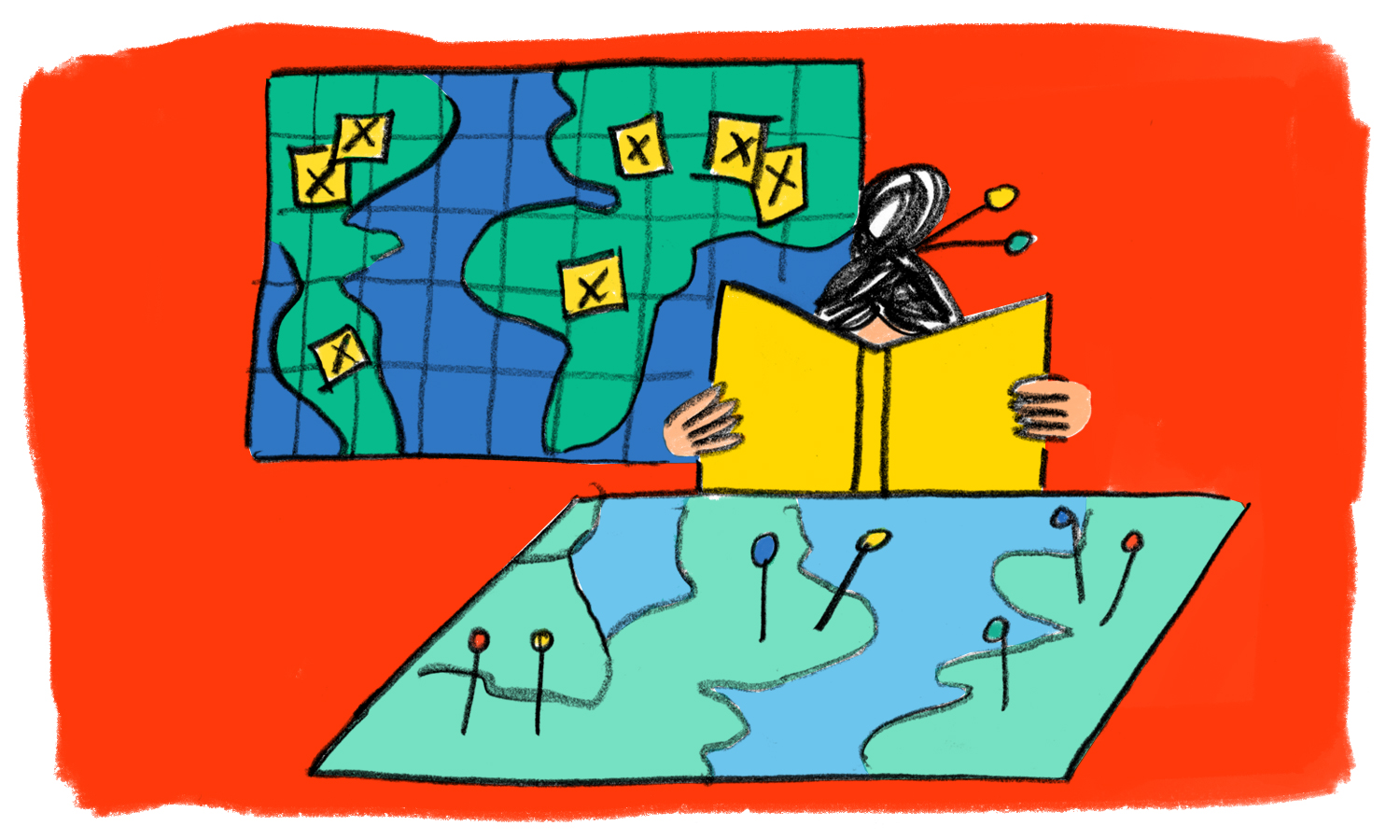
When you’re plotting to conquer the world
Emergent Strategy: Shaping Change, Changing Worlds by Adrienne Maree Brown
This is a lyrical, explorative, non-linear journey of the concept of emergent strategy. Brown explains at the outset that the book is meant to be perused, returned to and jumped around in. There are essays, poems, exercises, dialogues, assessments, facilitations, even a playlist. It’s a book for people interested in radical social change, who are willing to think expansively about what the future could look like, or are in need of help doing that kind of thinking.
— Miriam Zoila Pérez (TED Talk: How racism harms pregnant women — and what can help)
Mindset: The New Psychology of Success by Carol S. Dweck (TED Talk: The power of believing that you can improve)
This book, written by a Stanford professor, started a movement in education, parenting, business and beyond. Dweck explains key psychology research that has changed the way we think about and pursue our beliefs, our language and our behaviors.
— Eduardo Briceño (TED Talk: How to get better at the things you care about)
Peak: Secrets from the New Science of Expertise by Anders Ericsson and Robert Pool
Cowritten by Ericsson, the foremost expert on expertise development, this book masterfully describes deliberate practice and the research behind it and gives real-life examples and strategies to put it into action.
— Eduardo Briceño (TED Talk: How to get better at the things you care about)
Outliers: The Story of Success by Malcolm Gladwell (TED Talk: The unheard story of David and Goliath)
I love this book, because it confirms through specific data that outstanding people owe much more to context than individual talent.
— Sebastián Bortnik (TED Talk: The conversation we’re not having about digital child abuse)
The Confidence Game: Why We Fall for It … Every Time by Maria Konnikova
This book offers fascinating insight into how we get fooled and how we sometimes fool ourselves. It deftly weaves together Konnikova’s psychological expertise with some tragic stories of people who were scammed. While the focus is on pure scams and cons, you can’t read it without pondering broader lessons about business, politics and life.
— Tim Harford (TED Talk: How frustration can make us more creative)
The Lean Startup: How Today’s Entrepreneurs Use Continuous Innovation to Create Radically Successful Businesses by Eric Ries
One of my responsibilities in my job is to lead the innovation team, and this book is our bible. We use it as our main guide for our processes and structure.
— Sebastián Bortnik (TED Talk: The conversation we’re not having about digital child abuse)
The Element: How Finding Your Passion Changes Everything by Ken Robinson (TED Talk: How to escape education’s death valley)
I’ve always enjoyed Robinson’s TED Talks, as well as his views on education and personal development, and they led me to this book. Frankly, I wish I’d picked it up sooner! It presents a series of well-studied case studies about finding your “element.” It was a really effortless read, and as always with Sir Ken, you are left laughing — and thinking.
— Andrés Ruzo (TED Talk: The boiling river of the Amazon)
Start With Why: How Great Leaders Inspire Everyone to Take Action by Simon Sinek (TED Talk: How great leaders inspire action)
There’s a famous marketing phrase: “No one wants to buy a quarter-inch drill; they want to buy a quarter-inch hole.” I counsel my clients to sell the hole, not the drill. That’s the key to value-selling and value-based pricing. Start With Why is a great book to help teach the “sell the hole” approach in a natural, elegantly simple way.
— Casey Brown (TED Talk: Know your worth, and then ask for it)
When your idea of a vacation is stepping into someone else’s life
The Light of the World by Elizabeth Alexander
Alexander, Obama’s inaugural poet, wrote an absolutely heart-wrenching memoir after the death of her husband. By reading the book you come to care about her, you come to care about him, and you come to care about their whole family — her loss becomes your loss. You mourn alongside her.
— Caitlin Doughty (TED Talk: A burial practice that nourishes the planet)
This is one of the most beautiful memoirs I’ve ever read. A poet writes about the blinding shock of unexpected death (her husband died on a treadmill in her home) in magically heartfelt prose. Somehow, despite being about death, it’s desperately hopeful. No words are wasted, and every moment is precious in this book and this life.
— Carrie Poppy (TED Talk: A scientific approach to the paranormal)
So, How Long Have You Been Native?: Life as an Alaska Native Tour Guide by Alexis C. Bunten
Across the globe, cultural tourism is a well-established and growing industry as indigenous people showcase aspects of their culture and lives to travelers. It provides rich opportunities for greater cross-cultural knowledge, enhanced understanding of diverse lives and better insights into human universals, but it also exists against a historical context of colonialism that shapes people’s interactions today. In her witty memoir from the frontlines of an Alaska tour company, Bunten delves into these important complexities.
— Katie Hinde (TED Talk: What we don’t know about mother’s milk)
A Father’s Story by Lionel Dahmer
I picked up this book by the father of Jeffrey Dahmer for 50 cents on vacation, more out of morbid curiosity than any noble motivation. I was quickly swept up in deep self-reflection and truly great writing. Dahmer is not here to turn his son’s infamy into a book deal (or, at least, he doesn’t seem to be); he is here to explore whether his own worst qualities might have been passed onto his son and whether the worst parts of all of us might be reflected in the maddest among us. More than a sad read, it’s a deep and thoughtful one.
— Carrie Poppy (TED Talk: A scientific approach to the paranormal)
South of Forgiveness: A True Story of Rape and Responsibility by Thordis Elva and Tom Stranger (TED Talk: Our story of rape and reconciliation)
At a time when sexual misconduct, from campus rape to the actions of world leaders, is perpetually in the news, reading this recounting by Thordis and Tom of the darkest moment in both their lives is courageous, illuminating and ultimately redemptive. It’s an especially important book for the parents of boys — and teen boys and young men themselves — to read.
— Peggy Orenstein (TED Talk: What young women believe about their own sexual pleasure)
A Human Being Died That Night: Confronting Apartheid’s Chief Killer by Pumla Gobodo-Madikizela
Following the fall of apartheid, psychologist Gobodo-Madikizela, who was working for the Truth and Reconciliation Commission, is given a nightmare assignment: to spend hours and hours interviewing and trying to understand the jailed Eugene de Kok, who oversaw the torture and death squads of the regime and who arguably had the most apartheid-era blood on his hands. But rather than being a monstrous archetype, de Kok turned out to be a human, for better or worse. While hugs don’t ensue by the end amid stirring violins, Gobodo-Madikizela is repeatedly blindsided by finding little slivers of human connection with the man. An “if it can happen with them, it can happen anywhere” kind of story.
— Robert Sapolsky (TED Talk: The biology of our best and worst selves)
Lab Girl by Hope Jahren
I read this assuming it was fiction and was utterly amazed to find it was an autobiography. I’d like to recommend this account by a female scientist struggling to start and maintain a scientific career, against odds which seem overwhelming at times. It’s very funny, and Jahren’s quirky personality shines through her telling of almost unbelievable events, her deep struggles with depression and imposter syndrome and the friends, students and family who support her during her wild journey. Her life is an inspiration to scientists everywhere, and this book is a beautiful and hilarious love letter to science and the natural world.
— Natasha Hurley-Walker (TED Talk: How radio telescopes show us unseen galaxies)
When Breath Becomes Air by Paul Kalanithi
This was one of my favorite books I’ve read in the last three months. This memoir was written by the author after he was diagnosed with a terminal health condition. It reminds us to pause, be grateful and reflect and remind ourselves of the important things in our lives.
— Karim Abouelnaga (TED Talk: A summer school kids actually want to attend)
Still Alive: A Holocaust Girlhood Remembered by Ruth Kluger
An at-times biting, at-times sarcastic, and always piercingly insightful memoir of a young Viennese girl and her relationship with her family as the Nazis close in on them. Kluger’s extraordinary ability to see the irony in life leaves the reader shaking her head in wonder. My students love this book.
— Deborah Lipstadt (TED Talk: Behind the lies of Holocaust denial)
If This Is a Man and The Truce by Primo Levi
This book is a profound attempt to analyze how humans react when all that is familiar to them is forcibly stripped from them. How do they — or can they — maintain their dignity and sense of worth? Levi’s autobiography of his year of incarceration in Auschwitz and the way he managed to save himself from a morass of indignity and destruction rightfully ranks as one of the classics of the 20th century.
— Deborah Lipstadt (TED Talk: Behind the lies of Holocaust denial)
Life’s Work: A Moral Argument for Choice by Dr. Willie Parker
A deeply moving and personal testament to a life of devotion and service as an abortion provider and a person of faith, Parker’s memoir is important reading for anyone who has struggled with their own moral compass. He is not a theologian but brings that same dedication to exploring questions of morality, faith and his calling as an abortion provider in the deep South.
— Miriam Zoila Pérez (TED Talk: How racism harms pregnant women — and what can help)
Invisible Man, Got the Whole World Watching by Mychal Denzel Smith
This millennial coming-of-age memoir offers a progressive look at Black masculinity. Smith, a writer for The Nation, has written an uplifting, hopeful, and, at times, funny tale about what it means to be a young Black man in the 21st century.
— Brittney Cooper (TED Talk: The racial politics of time)
The Glass Castle by Jeannette Walls
Walls has one of the most interesting voices I’ve ever read. This is a richly interesting story about a demented, charismatic and visionary father raising four children in poverty.
— Daniel Levitin (TED Talk: how to stay calm when you know you’ll be stressed)
When you’re over summer blockbusters and want something with soul and emotion
Living Buddha, Living Christ: 20th Anniversary Edition by Thich Nhat Hanh
Vietnamese Buddhist monk Hanh is a shining light of gentle wisdom for our times. He is able to bridge Eastern and Western traditions simply by touching on the beauty that underlies them both. This book brings me great calm and comfort through its heart-melting and mind-opening insights.
— Lara Setrakian (TED Talk: 3 ways to fix a broken news industry)
What Love Is: And What It Could Be by Carrie Jenkins
Jenkins, a philosophy professor at the University of British Columbia, manages to make her investigation into the social and biological forces that shape romantic love both intellectually rigorous and disarmingly personal. I learned so much from this book — not just about how we understand and experience love, but also about how to approach a complex topic with wit and deep compassion.
— Mandy Len Catron (TED Talk: A better way to talk about love)
To Kill a Mockingbird by Harper Lee
This classic novel has timeless societal lessons, certainly, but I’ve taken evergreen personal inspiration from it through my decades of reading and re-reading it. As a child, I related to Scout, but now I look to Atticus for inspiration. As a mother in a complicated time, I work to teach my children to stand against prejudice and injustice, even when personally costly. Atticus Finch is a personal fictional hero of mine for his humility, his sense of justice and his unfailing love of his family and fellow humans.
— Casey Brown (TED Talk: Know your worth, and then ask for it)
The Problem of Pain by C.S. Lewis
This is the first book that my husband and I read together after our son Joel died. It has always been one of my favorite theological books. It wrestles with one of the greatest questions of faith: “How could a good God allow pain and suffering?”
— Amy Green (TED Talk: A video game to cope with grief)
The Sparrow by Mary Doria Russell
This is a very favorite book of mine. Russell wrestles with faith and suffering in the context of the silence of God, but within science fiction, the genre most suited to all of humanity’s greatest questions. My husband and I love this book and its sequel, and we find reflections of ourselves in the questions it asks and the answers the characters reluctantly discover.
— Amy Green (TED Talk: A video game to cope with grief)
The Forty Rules of Love: A Novel of Rumi by Elif Shafak (TED Talk: The politics of fiction)
Shafak captures the soul of Turkish society, both the best of it and the wounds embedded in it. In this book, she unpacks the story of Shams Tabrizi and Rumi and with it some of the precious wisdom of their Sufi way.
— Lara Setrakian (TED Talk: 3 ways to fix a broken news industry)
The Music Lesson: A Spiritual Search for Growth Through Music by Victor Wooten
Bass player Wooten is one of the greatest musicians in the world. It’s not a music lesson. It’s a life lesson. I’ve read it three times. It just keeps getting better.
— Daniel Levitin (TED Talk: how to stay calm when you know you’ll be stressed)
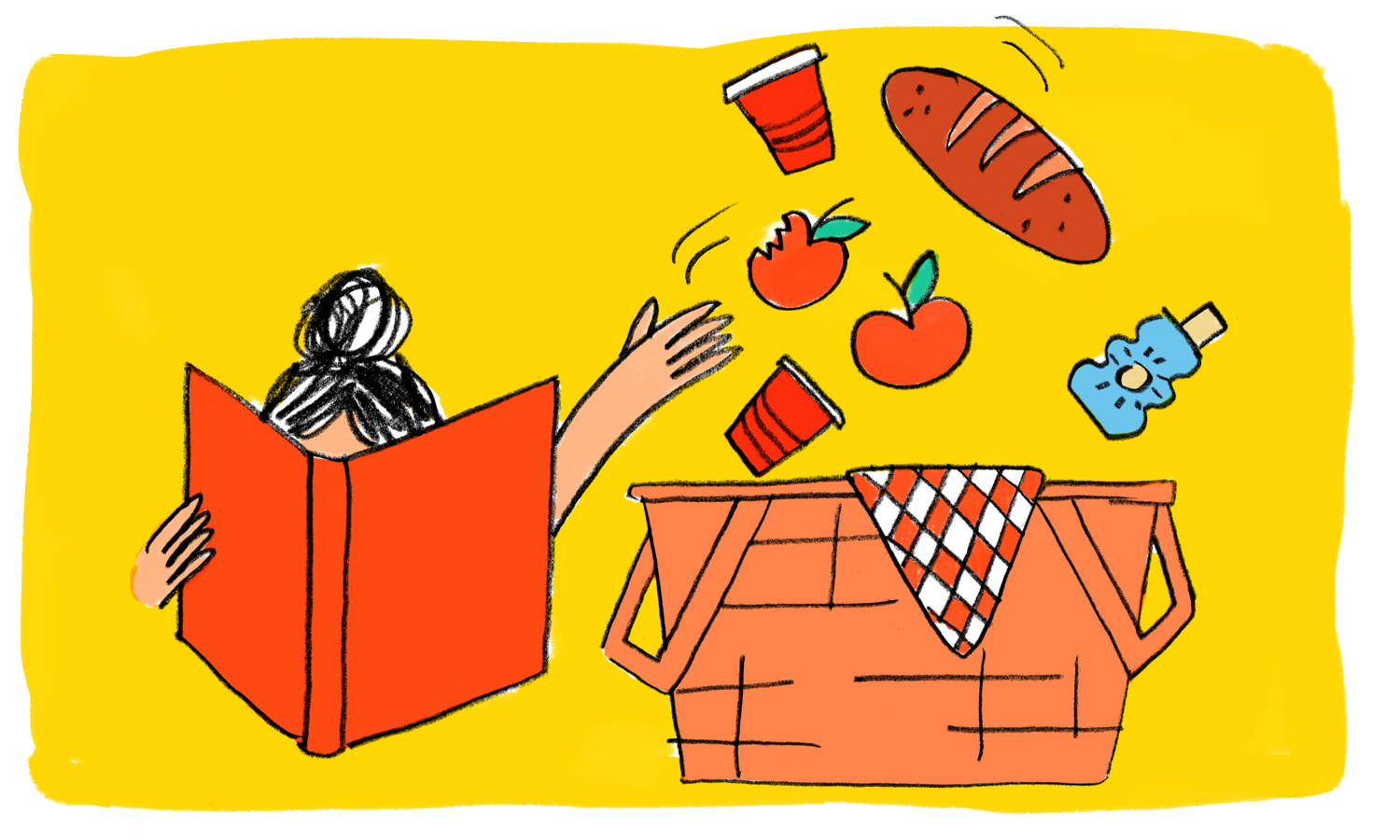
When you’re prepping for a picnic, BBQ or houseguests
Eat Yourself Fit: Make Your Workout Work Harder by Rosanna Davison
Davison is an Irish nutrition guru, and she shares some great recipes for healthy muffins, smoothies and bars.
— Triona McGrath (TED Talk: How pollution is changing the ocean’s chemistry)
The Happy Pear: Healthy, Easy, Delicious Food to Change Your Life by David Flynn
This book features modern vegetarian recipes with fresh produce, with particularly good recipes for curries.
— Triona McGrath (TED Talk: How pollution is changing the ocean’s chemistry)
Barefoot Contessa’s Parties! Ideas and Recipes for Easy Parties That Are Really Fun by Ina Garten
It’s really a tossup which of the Barefoot Contessa books I’d most like to recommend, because I cherish them all. Parties is my go-to cookbook for the summer entertaining season, with its fail-safe, crowd-pleasing recipes made with simple, fresh ingredients.
— Wendy Troxel (TED Talk: Why school should start later for teens)
The Flavor Bible: The Essential Guide to Culinary Creativity, Based on the Wisdom of America’s Most Imaginative Chefs by Karen Page and Andrew Dornenburg
This book was recommended to me by a professional chef after hearing of my work on innovation strategy; I’m told it’s widely used by chefs looking to create new dishes. Unusually for a cookbook, it has no recipes. Instead it offers a comprehensive set of suggestions for successful combinations of food items and flavors. Innovation in cuisine, as the book implies, can be a viewed as a guided search for valid combinations of ingredients and flavors.
— Martin Reeves (TED Talk: How to build a business that lasts 100 years)
Eat. Live. Go. Fresh Food Fast by Donal Skehan
Skehan is an Irish author and TV presenter, and the book has a nice mix of quick and easy healthy recipes along with ones that are a bit more challenging.
— Triona McGrath (TED Talk: How pollution is changing the ocean’s chemistry)
When you want useful information
The China Study: The Most Comprehensive Study of Nutrition Ever Conducted and the Startling Implications for Diet, Weight Loss and Long-Term Health by Thomas Campbell and T. Colin Campbell
Based on one of the largest scientific studies of human nutrition, this book inspired me to adopt a whole-food, plant-based diet as a way to improve my health. It turns out this hasn’t just been good for my own health, but that if we all adopted such an approach to eating, our collective carbon footprint could be reduced and we’d help make our planet healthier, too.
— Raj Panjabi (TED Talk: No one should die because they live too far from a doctor)
Nature of Investing: Resilient Investment Strategies Through Biomimicry by Katherine Collins
We have a lot to learn from nature about the problems we face as a world and how we might solve them. In this book, Collins says the best investors are like honeybees — they gather data, share findings as a group and reiterate this process until they create more resilient investments. If Warren Buffett and Mother Nature had a love child, this book would be it!
— Raj Panjabi (TED Talk: No one should die because they live too far from a doctor)
What You Really Really Want: The Smart Girl’s Shame-Free Guide to Sex and Safety by Jaclyn Friedman
In a culture that demands sexiness of women but condemns their sexuality, how do you make decisions about sex that you’re happy with? What’s great about this book is that it helps readers un-learn the scare tactics and slut-shaming about sexuality they’ve probably grown up with. Although the book is written for women and teen girls, most of the advice applies to people of any gender.
— Amy Adele Hasinoff (TED Talk: How to practice safe sexting)
The Sleep Revolution: Transforming Your Life, One Night at a Time by Arianna Huffington
As a sleep researcher, I found this book interesting, engaging and well-researched. Using a combination of storytelling from her own personal experience as well as numerous examples of the consequences of sleep loss from leading sleep scientists, this book provides a compelling and highly readable case for why, as a society, we need to wake up to the importance of sleep.
— Wendy Troxel (TED Talk: Why school should start later for teens)
Love in the Time of Colic: The New Parent’s Guide to Getting It On Again by Ian Kerner and Heidi Raykeil
I love gifting this book to new parents. It’s a humorous, frank, science-based discussion of how parenthood need not be at odds with sexuality and romance. It’s an incredibly relatable and quick read because which parent has time to read?
— Sofia Jawed-Wessel (TED Talk: The lies we tell pregnant women)
Wabi-Sabi for Artists, Designers, Poets & Philosophers by Leonard Koren
A very simple book with a very deep and complex message for innovators, entrepreneurs and even parents. No matter how elegant or precise you want to make your project — be it a book, a product or even a public policy — recognize that rough and imprecise elements are actually as important as the polished and smooth aspects.
— Ari Wallach (TED Talk: 3 ways to plan for the (very) long term)
Expecting Better: Why the Conventional Pregnancy Wisdom Is Wrong — and What You Really Need to Know by Emily Oster
Our culture insists on not resting until every expectant parent is a strung-out, anxious mess. This easy-to-read yet data-driven book is the antidote. Oster, an economist highly trained in interpreting information, guides readers through the science of pregnancy so they can take a step back from the hysteria and make fact-based, informed decisions.
— Sofia Jawed-Wessel (TED Talk: The lies we tell pregnant women)
The Stars: A New Way to See Them by H.A. Rey
I wanted to learn star constellations from the time I was a young kid, but star-gazing charts always befuddled me. I couldn’t square the weird scribbles on the paper in my hand with Leo the Lion or Ursa Major the Bear above me. But then someone gave me this book, and Rey (the illustrator of the Curious George books) redraws the lines so that yes, Taurus looks like the bull and the Corona Borealis is clearly a crown. You also learn the accompanying myths, as well as some simple astronomy. Go outside with this book and your friends, and watch the night sky suddenly make sense.
— Caroline Paul (TED Talk: To raise brave girls, encourage adventure)
The Safety Godmothers: The ABCs of Awareness, Boundaries and Confidence for Teens by Ellen Snortland and Lisa Gaeta
Every one of us, especially teens, could benefit from learning about self-defense. The authors share their expertise in violence prevention with a series of readable “clips” that contain personal safety tips as well as verbal exercises. Some books are a great summer read. Some books can save your life. This rare book is both.
— Nagin Cox (TED Talk: What time is it on Mars?)
Radical Remission: Surviving Cancer Against All Odds by Kelly A. Turner
The author of this book traveled to 15 countries to interview cancer survivors and healers. It’s a great read for anyone who is dealing with cancer or who wants to prevent its recurrence.
— Lisa Dazols (TED Talk: This is what LGBT life is like around the world)
When you want to learn from the past
Alexander Hamilton by Ron Chernow
Chernow writes an engaging story that exposes a fascinating life in an enjoyable and educational way. I found Hamilton’s life to be inspiring, and was struck by how influential he was in shaping the US.
— Eduardo Briceño (TED Talk: How to get better at the things you care about)
Wonderland: How Play Made the Modern World by Steven Johnson (TED Talk: The playful wonderland behind great inventions)
This is a delightful exploration of how games, music, fashion and other fripperies shaped the modern world. A desire for purple dye led to early global exploration; it was a computer game that kick-started the hacker revolution; and demand for cotton fashions helped spark the Industrial Revolution. It’s a book about fun that’s fun to read.
— Tim Harford (TED Talk: How frustration can make us more creative)
The Tragic Sense of Life: Ernst Haeckel and the Struggle over Evolutionary Thought by Robert J. Richards
What do Charles Darwin and the dancer Isadora Duncan have in common? They both shared and deeply admired a mutual friend: the German biologist Ernst Haeckel. Richards writes a truly engrossing story about Haeckel, a product of 19th-century Romanticism, who was part artist and part scientist and who became through his own insight and conviction the epicenter of a powerful clash between science and religion. Even 100 years later, the repercussions of his actions continue to be felt in today’s scientific, popular, religious, even political discourse.
— Alejandro Sánchez Alvarado (TED Talk: To solve old problems, study new species)
Cartographies of Time: A History of the Timeline by Daniel Rosenberg and Anthony Grafton
This is another book that I pick up often. Its dry title belies the wonder you get when looking through it. The history of the timeline is a beautiful meditation on how we think about and visualize time, as well as the cultural and technological contexts that influence our aesthetics. It’s like the history of remembering history. The text is more academic than whimsical, but I love to understand the stories by just looking at the diagrams and timelines. One of my favorites is Clarence Larkin’s diagrams of the bible, especially the book of Revelation, truly extraordinary images that attempt to make plain the human condition through Christian stories.
— Emily Parsons-Lord (TED Talk: Art made of the air we breathe)
The Victorian Internet: The Remarkable Story of the Telegraph and the Nineteenth Century’s On-line Pioneers by Tom Standage
This book is a riveting history of the telegraph. What I love about it is how it demonstrates that our present-day fears and hopes about new communications technologies are more familiar than we might think.
— Amy Adele Hasinoff (TED Talk: How to practice safe sexting)
JFK: A Vision for America edited by Stephen Kennedy Smith and Douglas Brinkley
This beautifully photographed book came out this year, to mark JFK’s 100th birthday, and it’s a vivid tribute to his words and his dedication to the American ideals that he so movingly inspired through his speeches. It’s a fun read or coffee table book that profiles the “idealist without illusions.”
— Laura Galante (TED Talk: How (and why) Russia hacked the US election)
The Invention of Nature: Alexander von Humboldt’s New World by Andrea Wulf
Wulf tells the story of one of history’s greatest minds, Alexander von Humboldt, in his context: his time, place, personal and professional struggles, as well as his exciting adventures and discoveries. By doing so she brings him to life, but she also transported me back to an era when the world was still a vast unknown. I’ve read it a few times now, and each time I am left impressed by the interconnectedness of our world and I’m hungry to keep exploring it.
— Andrés Ruzo (TED Talk: The boiling river of the Amazon)
In a crisp and engaging narrative, the author paints a comprehensive, richly textured landscape of the times and the impact the times exerted on the thinking and enunciation of scientific principles by Alexander von Humboldt. Von Humboldt’s life is as fascinating as the breadth of his contributions to the modern understanding of life in our planet.
— Alejandro Sánchez Alvarado (TED Talk: To solve old problems, study new species)















